As Putin's invasion of Ukraine continues to unfold, it is clear the attack has all gone Russia’s way. Russian forces are attacking Kyiv and Kharkiv, Ukraine’s second largest city and appear to have taken the territory around the Chernobyl, the site of the 1986 nuclear reactor explosion that ranks as one of worst nuclear accidents in history.
[Ukrainian President Volodymyr] Zelenskyy, who earlier cut diplomatic ties with Moscow and declared martial law, described Russian forces advancing on a series fronts, including a “difficult situation” developing in Kharkiv, Ukraine’s second-largest city, just over 20 kilometers away from the eastern border with Russia, and Russian troops slowly advancing from the north on the city of Chernihiv. He said a Russian airborne unit at an airport just outside Kyiv, the capital, was being destroyed.
Militarily, Putin is clearly winning.
Yet the speed of Putin's apparent success merely underscores an important but as yet unexplored question: what is the end game? Putin is occupying Ukraine—does he mean to conquer the whole country? How will Putin contend with the inevitable economic fallout, much of which is not dependent upon the sanctions being imposed by the US and Great Britain? How well is this war being received within Russia?
There is, of course, no way to fully answer these questions without a crystal ball, but we may still explore them and perhaps gain some insight as to what the answers might look like.
Conquest Of Ukraine: Feasible, But Is It Desirable?
Putin is well on his way to conquering Ukraine. However, it is far from certain he means to keep it. Even as his troops lay seige to Kyiv, Putin has put forward “terms of surrender”, by which Russian forces would presumably leave Ukraine.
Moscow is willing to negotiate terms of surrender with Kiev regarding the ongoing Russian military offensive currently taking place in Ukraine, Kremlin Press Secretary Dmitry Peskov said on Thursday.
According to Peskov, Russian President Vladimir Putin has expressed his preparedness to engage in discussions with his Ukrainian counterpart, with a focus on obtaining a guarantee of neutral status and the promise of no weapons on its territory.
How exactly such an agreement could be enforced without an ongoing Russian presence in Ukraine has not been made plain at this time.
For its part, Ukraine seems willing to at least discuss the proposals, as Zelenskyy has signaled a desire to discuss “non-aligned status” for Ukraine.
The Kremlin says it will analyze the Ukrainian president’s offer to discuss a non-aligned status for his country, as a Russian military invasion pushes closer to Kyiv.
Ukraine President Volodymyr Zelenskyy said he was ready to hold talks on the issue.
Asked about Zelenskyy’s offer, Kremlin spokesman Dmitry Peskov on Friday described it as “a move in a positive direction.”
Paradoxically, the Russian government appears to have internal conflicts over Zelenskyy’s proposal, with the Foreign Minister appearing to shoot down negotiations.
But Russian Foreign Minister Sergey Lavrov said Zelenskyy “is simply lying” when he offers to discuss non-aligned status for Ukraine.
Lavrov said at a briefing that Zelenskyy “missed the opportunity” to discuss a neutral status for Ukraine when Russian President Vladimir Putin proposed it.
However, now that war has come, the options for both sides quickly reduce to either combat or conversation, and how long Putin can sustain his “special military operation” remains a question.
On paper, Putin has a tremendous advantage in terms of men and materiel. According to Global Firepower, Russia has the 5th largest military in the world
This is far larger than anything Ukraine can hope to put in the field. However, Russia's military has other strategic commitments, and the size of Putin's land army is much closer in size to Ukraine.
Of Putin's land army, the majority is apparently already committed to the Ukraine, as he began the invasion with some 190,000 troops.
Russia has amassed up to 190,000 troops on the borders with Ukraine, the US warned on Friday, claiming it was “the biggest mobilisation of troops since the second world war” and an increase of more than 90,000 in less than a month.
Even with pro-Russian separatist forces among the contingent of 190,000, the availability of Russian reserves to reinforce the Ukraine operation is still a question. With the majority of his land force already committed to Ukraine (assuming, of course, the totals reported in the media are accurate), Putin's reserve force—and thus capacity for an extended conflict, let alone an occupation—is likely to be “limited”.
Putin can take Ukraine. It is far from certain he can keep Ukraine, and even further that he intends to keep Ukraine.
The Ruble Has Collapsed. Can It Recover?
Wars cost money, and the Ukrainian invasion is already proving costly to Putin. As I have noted already, the Russian ruble has crashed not just against dollar and the euro, but also against the Chinese yuan—and China is presumably the strategic trading partner that will enable Russia to withstand the sanctions that have been imposed by the US and the UK. While the ruble has recovered to a significant degree, as of this writing it is still greatly weakened against the yuan on the week.
Yet the economic pain goes beyond currency collapse. Russia's leading stock exchange index, the MOEX, is down nearly 43% as of Thursday's close.
While it, also, is staging a bit of a comeback, it is still highly likely to end the week with a double digit percentage decline.
This is before the economic impacts of sanctions can even begin—which they will. The UK has announced what Prime Minister Boris Johnson calls “the largest ever” set of sanctions against Russia.
The prime minister announced 10 measures the UK was taking immediately. The UK will freeze assets of all major Russian banks including VTB, the country’s second largest bank with assets totalling £154bn.
Individual sanctions will be imposed on over 100 individuals, entities and subsidiaries, including Rostec, the country’s biggest defence company, which exports £10bn in arms a year, as well as four other defence companies.
Oligarchs who will be sanctioned include Putin’s former son-in-law Kirill Shamalov, Russia’s youngest billionaire; Denis Bortnikov, the chair of VTB Bank management board; and Yury Slyusar, the director of the United Aircraft Corporation. The Russian airline Aeroflot will be banned from landing in the UK
Other sanctions introduced by the UK include export restrictions on goods to Russia, particularly dual-use (civilian and military) items as well as high tech goods.
Addressing America Thursday afternoon, President Biden added his own sanctions against Russia to those of the UK:
• BIDEN IMPOSING STRONG SANCTIONS, NEW LIMITS ON RUSSIA
• BIDEN: IMPACT ON U.S., ALLIES WILL BE MINIMIZED
• BIDEN: PUTIN IS THE AGRESSOR
• BIDEN: RUSSIA ABILITY TO DEAL IN YENS, EUROS TO BE LIMITED *BIDEN: SANCTIONING RUSSIA BANKS
• BIDEN: WILL BLOCK FOUR MAJOR RUSSIA BANKS
• BIDEN: ADDING SANCTIONS ON RUSSIAN ELITES
• BIDEN: WILL CUT OFF SOME OF RUSSIA IMPORTS
• BIDEN SAYS ESTIMATE SANCTIONS WILL CUT OFF MORE THAN HALF OF RUSSIA'S HIGH-TECH IMPORTS
Yet the economic consequences go beyond sanctions. As I pointed out last month, Europe is Russia's largest trading partner, according to the European Commission:
Trade picture
• Russia is the EU's fifth largest trade partner, representing 4.8% of the EU’s total trade in goods with the world in 2020.• The EU is Russia's biggest trade partner, accounting for 37.3% of the country’s total trade in goods with the world in 2020. 36.5% of Russia’s imports came from the EU and 37.9% of its exports went to the EU.
• Russia is the origin of 26% of the EU’s oil imports and 40% of the EU’s gas imports*. Energy price volatility directly affects the volume of bilateral trade.
• Total trade in goods between the EU and Russia in 2020 amounted to €174.3 billion. The EU’s imports were worth €95.3 billion and were dominated by fuel and mining products – especially petroleum (€67.3 billion, 70.6%), agriculture and raw materials (€4.3 billion, 4.5%), chemicals (€4.1 billion, 4.3%) and iron and steel (€4.0 billion, 4.1%). The EU’s exports totalled €79.0 billion. They were led by machinery and transport equipment (€35.0 billion, 44.1%), chemicals (€16.7 billion, 21.1%), and manufactured goods (€7.6 billion, 9.6%) as well as agriculture and raw materials (€6.9 billion, 8.7%).
• Two-way trade in services between the EU and Russia in 2020 amounted to €27.7 billion, with EU imports of services from Russia representing €8.9 billion and exports of services to Russia accounting for €18.8 billion.
• The EU is the largest investor in Russia. In 2019, the EU’s outward foreign direct investment (FDI) stock in Russia amounted to €311.4 billion, Russia’s FDI stock in the EU was estimated at €136 billion.
* Data from 1st semester of 2020
While the exact impacts of the Ukraine operation will not be known for some time, it is certain that European trade with Russia will be drastically reduced for a time. The loss of some or all of the €95.3 billion in exports to Europe will unquestionably put a dent in Russia's economy, and the ruble's steep decline against the yuan indicates China will not be picking up all that much of the slack.
The War Is Not Popular Among Russians
Perhaps the most intriguing aspect of Putin's Ukraine adventure is the level of internal pushback he has gotten within Russia itself. Protests against the invasion have erupted across the country, starting almost immediately after Putin announced the invasion.
Protests erupted throughout the country after Putin announced in the early morning hours of Thursday what Ukrainian officials are calling a full-scale invasion of their country. Opposition activists rapidly began organizing social media calls for assemblies against the war.
The protests appear to have continued despite Russian police making massive arrests of demonstrators, with at least 1,700 being detained as of the latest reports:
Russian police have detained more than 1,700 people at anti-war protests across dozens of cities as thousands took to the streets after President Vladimir Putin sent troops to invade Ukraine, an independent monitor said Thursday.
Social media has been filled with striking images and video footage of the demonstrations:
In Moscow,
In St. Petersburg,
Russians are telling Putin “Nyet". In at least 55 cities there are reports of Russians telling Putin “Nyet” to a war in Ukraine.
While Putin is an unapologetic authoritarian, popular protests and widespread discontent are still a threat to his hold on power. How long he can ignore unrest at home is an eternal question, but the answer is not likely to be “indefinitely”.
NATO Is Back
One consequence is already known: NATO has rediscovered its purpose.
Bear in mind that the original intention of NATO was explicitly to deter Soviet aggression against Europe.
With this in mind, several Western European democracies came together to implement various projects for greater military cooperation and collective defence, including the creation of the Western Union in 1948, later to become the Western European Union in 1954. In the end, it was determined that only a truly transatlantic security agreement could deter Soviet aggression while simultaneously preventing the revival of European militarism and laying the groundwork for political integration.
Accordingly, after much discussion and debate, the North Atlantic Treaty was signed on 4 April, 1949. In the Treaty’s renowned Article 5, the new Allies agreed “an armed attack against one or more of them… shall be considered an attack against them all” and that following such an attack, each Ally would take “such action as it deems necessary, including the use of armed force” in response. Significantly, Articles 2 and 3 of the Treaty had important purposes not immediately germane to the threat of attack. Article 3 laid the foundation for cooperation in military preparedness between the Allies, and Article 2 allowed them some leeway to engage in non-military cooperation.
Putin's invasion of Ukraine has made NATO’s newer members especially nervous about his ambitions beyond Ukraine. The Baltic states in particular are fearful of reconquest, as they were ruled from Moscow going back to the Romanov tsars, with a brief period of independence before being annexed again by Stalin.
Culturally and linguistically different, the Baltic countries don’t have the same connection to Russian history and identity. However, they were ruled by Moscow for most of the past 200 years, first by the Russian Empire, then for almost 50 years following World War II by the Soviet Union. All three countries have ethnic Russian minorities; in Latvia and Estonia, they make up about one-quarter of the population.
It surely comes as no surprise that the Baltic states, along with NATO’s Eastern European members, activated Article 4 of North Atlantic Treaty, to begin consultations—and, presumably, preparations—to contain resurgent Russian expansionism.
During the meeting, Bulgaria, the Czech Republic, Estonia, Latvia, Lithuania, Poland, Romania and Slovakia triggered urgent consultations under Article 4 of NATO’s founding Washington Treaty. These are launched when “the territorial integrity, political independence or security of any of the (NATO) parties is threatened.”
Stoltenberg said that NATO has decided to activate emergency planning to allow commanders to move forces more quickly. He spoke shortly after envoys to the trans-Atlantic alliance agreed to further beef up its land, sea and air forces on its eastern flank near Ukraine and Russia.
Whether Europe is returning to the day's of the Iron Curtain and the Cold War is not fully certain, but at this moment at least, Russia is nobody's friend in Europe.
How To End This?
Thus we come back to the initial question: what is the end game in Ukraine? How do the heads of Europe along with Putin bring an end to this Ukrainian war (and let us be clear, this is unequivocally a war, not a “special military operation")?
Is it even possible to negotiate a return to the status quo ante? That seems unlikely. Blood cannot be unshed, missiles cannot be unlaunched, bombs cannot be undropped. Putin has changed the political dynamics at least of Eastern Europe and quite possibly the whole continent. That will be true even when the shooting has stopped.
Will Putin negotiate a non-aligned status for Ukraine with Zelenskyy? That would certainly be a way for him to end this war and plausibly declare victory—and just this morning the Kremlin announced a willingness to meet with a Ukrainian delegation to explore that option.
Russia is ready to send a delegation to the Belarusian capital Minsk for talks with Ukraine, Kremlin spokesman Dmitry Peskov said on Friday, a day after Moscow launched a massive invasion of its southern neighbour.
Yet even if Putin does negotiate with Zelenskyy, and doubly so if he does not, it seems clear that Europe has in Russia not a rising trade partner, but a rising adversary. That reality is not likely to change, and the political dynamics of Russia-as-enemy are not likely to end any time soon.
Such is the state of Europe this Ukrainian war has wrought.



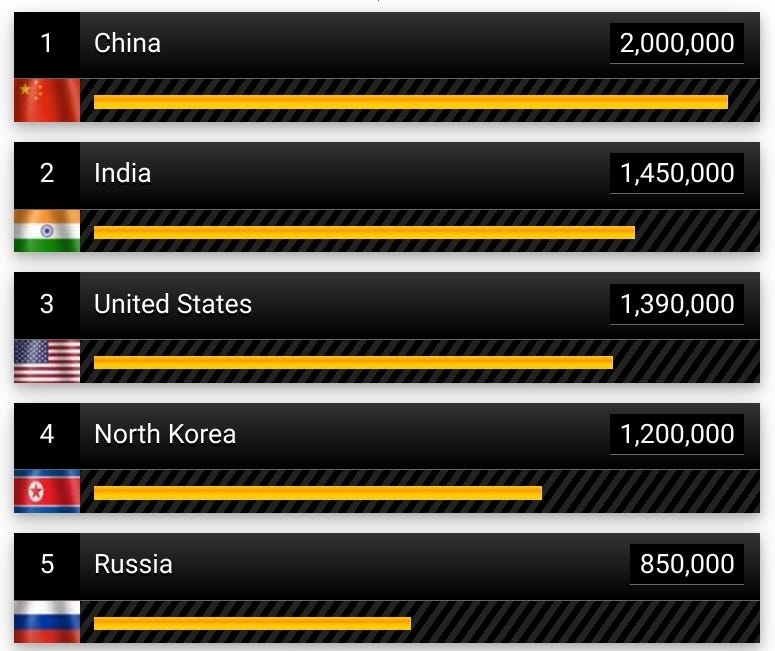
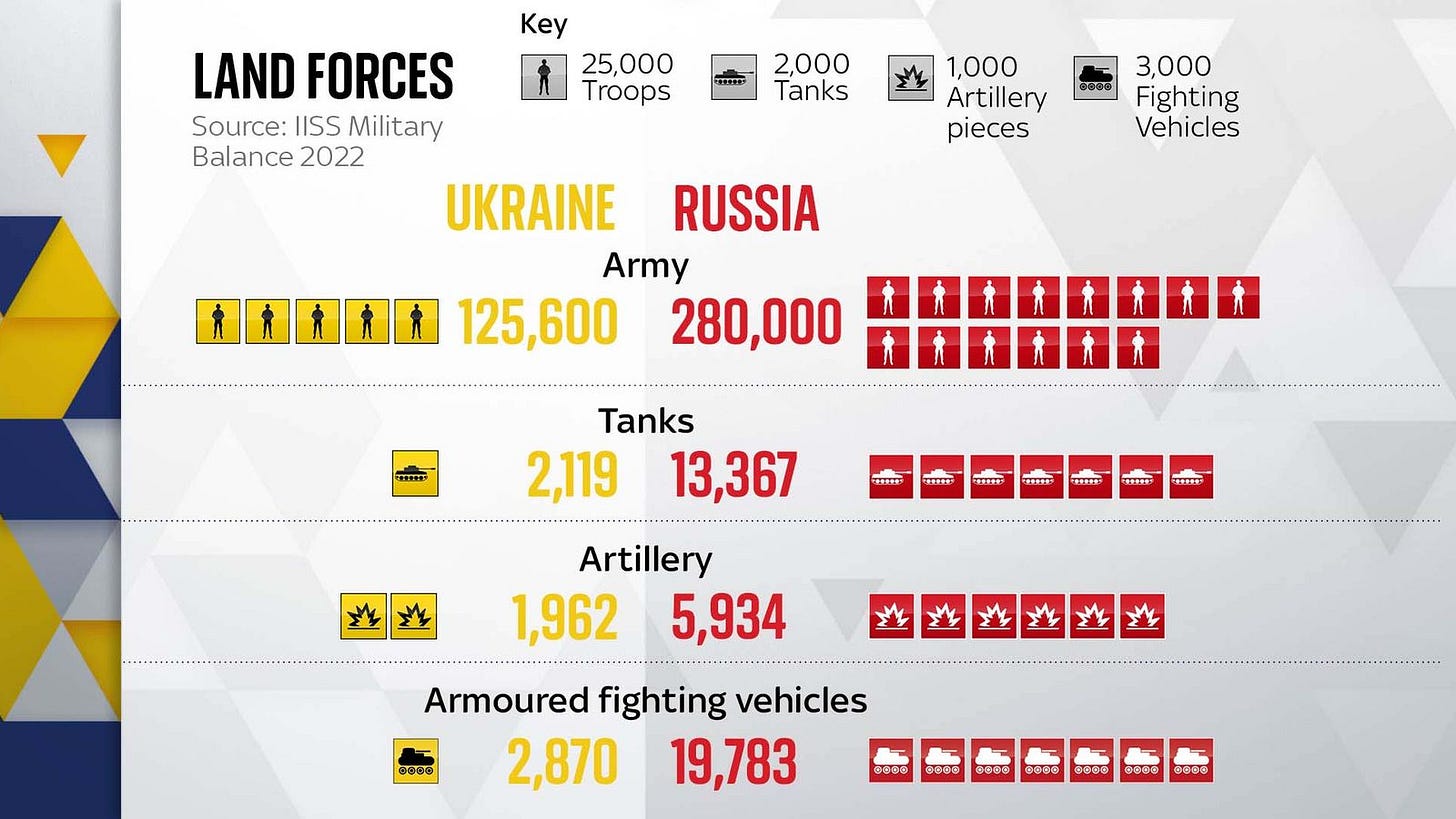
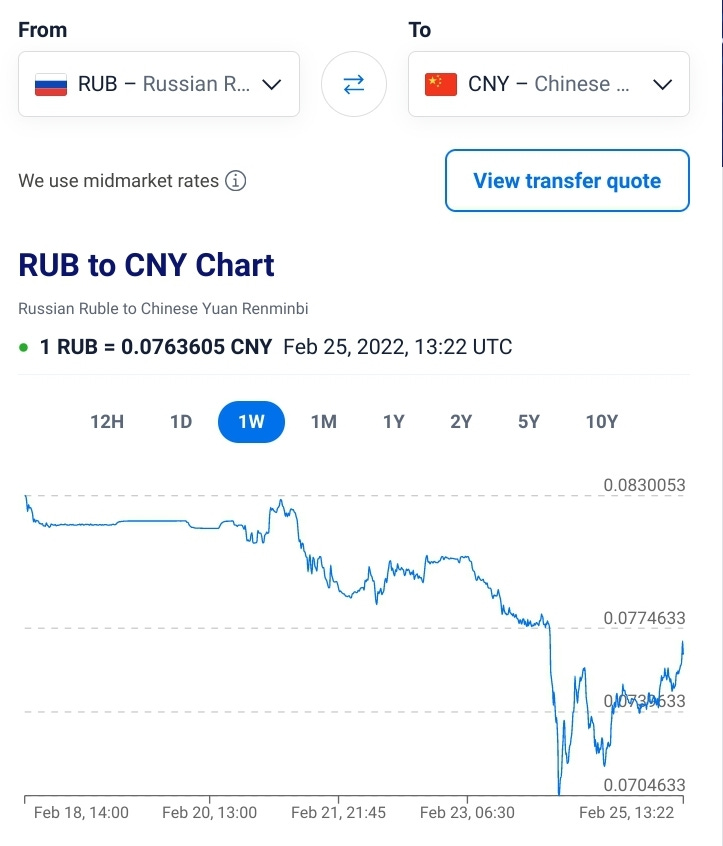
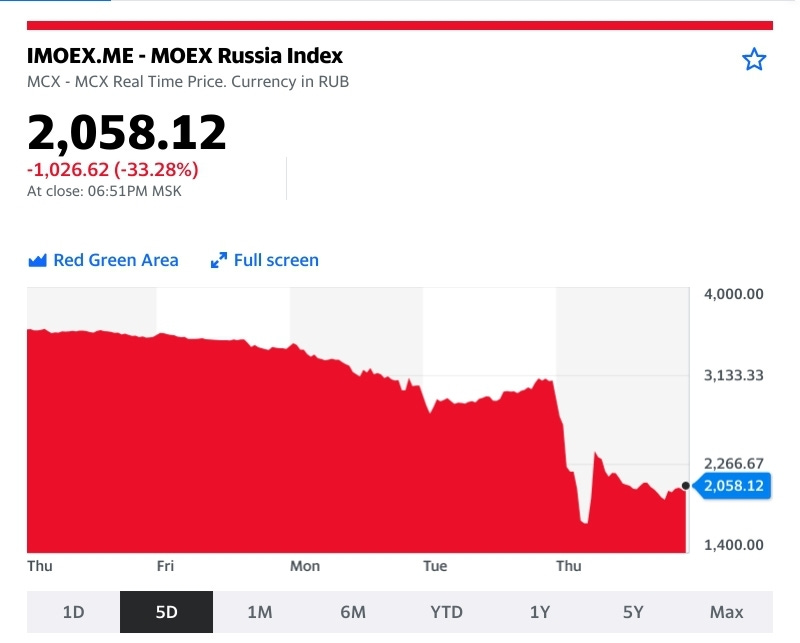

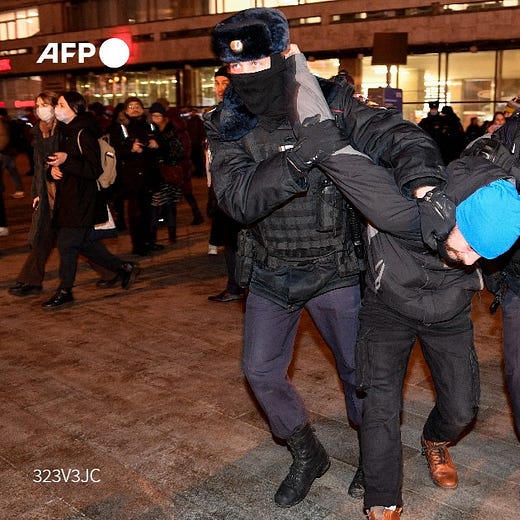
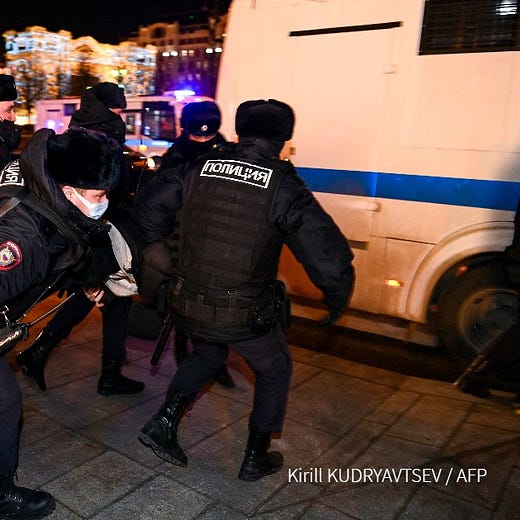
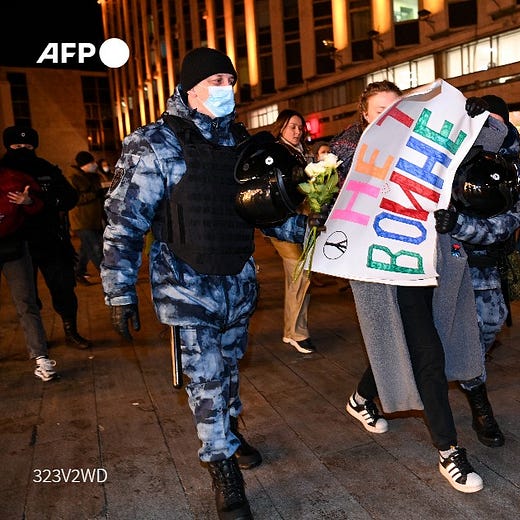
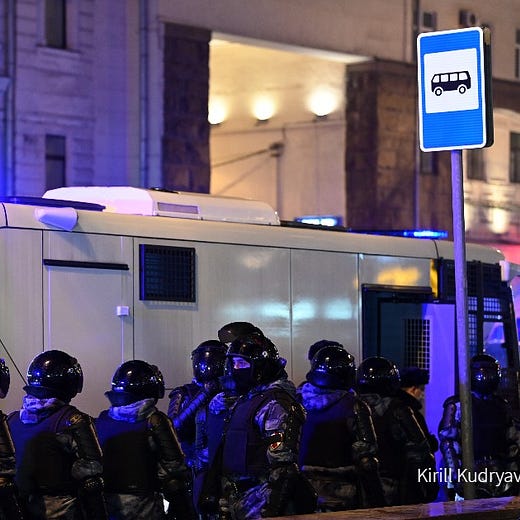

WOW! Thank you for this detailed overview of the situation as of now. This is alarming to saw the least. It seems we humans learn little from our past follies. Bob Dylan's Masters of War could not be more appropriate!
...and where do the gas pipelines fit in the picture? The spice must flow.